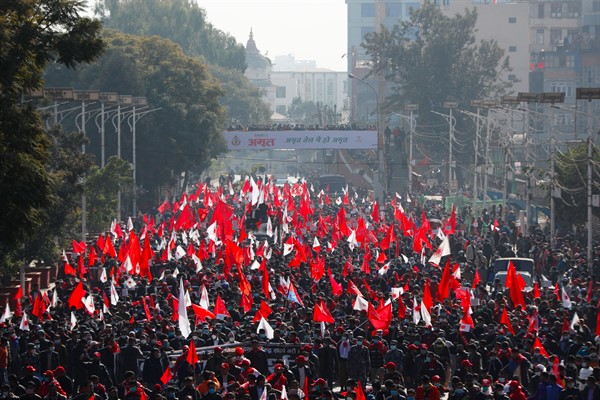The aftershocks of Prime Minister K.P. Sharma Oli’s decision last month to dissolve the lower house of Nepal’s Parliament and call for early elections are still being felt throughout the country. Oli’s controversial move, designed to thwart growing demands for him to leave office, has been widely criticized—including within his own Nepal Communist Party, or NCP—for contravening Nepal’s 2015 constitution. His insistence on maintaining power marks a potentially dangerous juncture along Oli’s drift toward authoritarianism, and could reverse democratic gains Nepal has made since its 10-year civil war ended in 2006.
The latest episode in Nepal’s roiling politics was entirely predictable. Oli took power in 2018, after campaigning in the previous year’s elections on a staunchly nationalist platform. The NCP and its fellow leftists in the Maoist party were able to capitalize on a wave of anti-Indian sentiment owing to a blockade that New Delhi imposed in 2015, and they together secured a nearly two-thirds majority in Parliament. Oli then sealed a “gentleman’s agreement” with Pushpa Kamal Dahal, the leader of the Maoists, to merge their parties and to take turns holding the top job during the government’s five-year term.
Many in Kathmandu thought the strong mandate of the newly formed NCP would ensure the kind of stability rarely afforded to Nepal’s governments; the country has had no fewer than 26 prime ministers in the past 30 years. But the NCP, born from a marriage of convenience, proved to be fraught with divisions from the start. Oli’s centralization of power and steadily escalating rivalry with Dahal ultimately rendered the NCP government largely ineffective. Factions within the party competed for influence, with calls for Oli’s resignation growing louder throughout 2020. A formal split was only narrowly averted thanks in part to diplomatic efforts by China, which has apparently calculated that a unified NCP-led government in Kathmandu is a more reliable ally.

